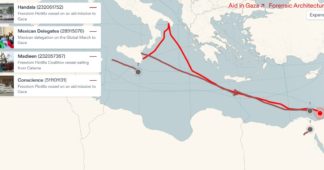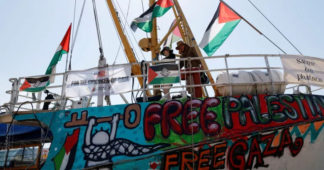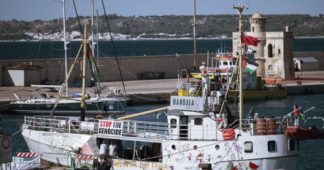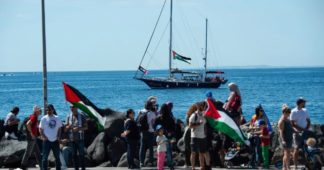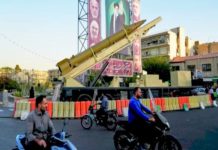By Al Jazeera Staff
Aug 31, 2025
More than 50 ships are heading to Gaza to challenge Israel’s illegal blockade and deliver urgent humanitarian aid.
A global fleet of boats is preparing to set sail for Gaza as part of an international maritime initiative aimed at delivering humanitarian aid to starving people in Gaza.
The first convoy, consisting of dozens of small civilian vessels carrying activists, humanitarians, doctors, seafarers, and humanitarian supplies, is scheduled to depart from Spanish ports on August 31, to meet up in Tunisia with a second wave on September 4.
Organisers describe the Global Sumud Flotilla as the largest maritime mission to Gaza, bringing together more than 50 ships and delegations from at least 44 countries.

Which countries are taking part?
According to the Global Sumud Flotilla, delegations from 44 countries have already committed to sail to Gaza as part of the largest maritime mission to break Israel’s illegal siege.
Countries from six continents will be taking part in the flotilla, including countries such as Australia, Brazil, South Africa and numerous European states.
According to the group, participants are unaffiliated with any government or political party.
Who are the groups participating?
This mission is organised by four major coalitions, including groups that have participated in previous land and sea efforts to Gaza:
- Global Movement to Gaza (GMTG) – Formerly known as Global March to Gaza, is a grassroots movement organising global solidarity actions to support Gaza and break the siege.
- Freedom Flotilla Coalition (FFC) – With 15 years of experience running sea missions, including past flotillas such as the Madleen and Handala, FFC provides hands-on advice, guidance, and operational support to current efforts to break the Gaza blockade.
- Maghreb Sumud Flotilla – Formerly known as the Sumud Convoy, is a North Africa-based initiative carrying out solidarity missions to deliver aid and support to Palestinian communities.
- Sumud Nusantara – A people-led convoy from Malaysia and 8 other countries, that aims to break the Gaza blockade and foster solidarity among Global South nations.
Collectively, they will form the largest coordinated civilian flotilla in history.
According to the Global Sumud Flotilla website, the coalition comprises a range of people, including organisers, humanitarians, doctors, artists, clergy, lawyers, and seafarers, who are united by a belief in human dignity, the power of nonviolent action, and a single truth: the siege and genocide must end.
A steering committee has also been set up, which includes the likes of Swedish activist Greta Thunberg, historian Kleoniki Alexopoulou, human rights activist Yasemin Acar, socioenvironmentalist Thiago Avila, political scientist and lawyer Melanie Schweizer, social scientist Karen Moynihan, physicist Maria Elena Delia, Palestinian activist Saif Abukeshek, humanitarian Muhammad Nadir al-Nuri, activist Marouan Ben Guettaia, activist Wael Nawar, activist and social researcher Hayfa Mansouri, and human rights activist Torkia Chaibi.
Although hundreds will set sail from the organised fleet, tens of thousands of others have registered to participate in the initiative.

When will the ships depart and how long to reach Gaza?
In a media briefing from Placa del Rei in Barcelona, Saif Abukeshek said the exact number will be specified later and that the details of the specific ports and ships have been withheld for security reasons.
The group estimates that the fleet will take between seven and eight days to make the approximately 3,000km (1,620-nautical-mile) journey to Gaza.
What is a flotilla and why send aid by sea?
A flotilla is a group of boats or ships organised to deliver essential supplies, such as food, medicine and other materials, to regions in crisis. They are usually organised when traditional supply routes such as air and land corridors are blocked or inaccessible.
Since 2007, Israel has tightly controlled Gaza’s airspace and territorial waters, restricting the movement of goods and people. Even before the war, Gaza had no functional airports after Israel bombed and destroyed the Yasser Arafat International Airport in 2001, just three years after it opened.
Humanitarian and grassroots flotillas usually operate under the protection of international organisations and are governed by naval laws.
By delivering aid by sea, the Sumud flotilla aims to confront Israel’s blockade head-on and carry a message that the siege must end.

What has happened to previous flotillas?
Several Freedom Flotilla vessels have attempted to break the blockade of Gaza.
In 2008, two boats from the Free Gaza Movement successfully reached Gaza, marking the first breach of Israel’s naval blockade. The movement, founded in 2006 by activists during Israel’s war on Lebanon, went on to launch 31 boats between 2008 and 2016, five of which reached Gaza despite heavy Israeli restrictions.
Since 2010, all flotillas attempting to break the Gaza blockade have been intercepted or attacked by Israel in international waters.
2010 – Gaza Freedom Flotilla
In 2010, Israeli commandos raided the Mavi Marmara in international waters. The assault killed 10 activists and injured dozens, leading to global outrage. The ship was carrying humanitarian aid and more than 600 passengers.
We remind our readers that publication of articles on our site does not mean that we agree with what is written. Our policy is to publish anything which we consider of interest, so as to assist our readers in forming their opinions. Sometimes we even publish articles with which we totally disagree, since we believe it is important for our readers to be informed on as wide a spectrum of views as possible.
